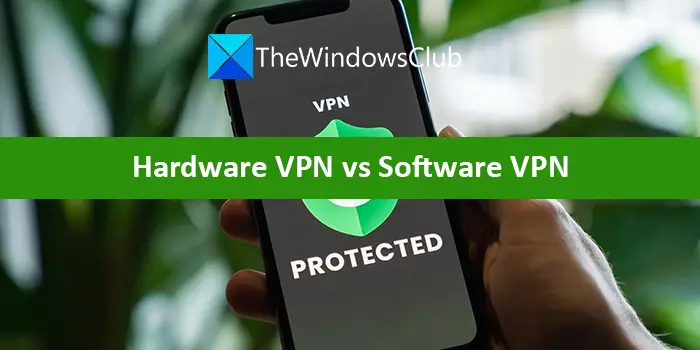VPN is important for privacy and security on today’s internet. There are two kinds of VPNs available, Hardware VPN and Software VPN. In this guide, we explain to you what they are and the differences between Hardware VPN and Software VPN.

What is Software VPN?
A software VPN is nothing but a VPN that can be downloaded onto our devices. The software we download connects our device to a server located in the country we choose. Software VPN comes with a lot of features and encryption to protect our data. The connection between the server and our device is fully encrypted too. It replaces your IP address with another IP address of the location you choose in the settings of the VPN. Even, your ISP cannot track the traffic or data with a software VPN.
What is Hardware VPN?
Hardware VPN is nothing but a piece of hardware that is dedicated to providing VPN features to our devices. There are some routers that have built-in VPN functionalities. They can also be considered hardware VPNs.
Hardware VPNs are built with dedicated CPUs to encrypt and decrypt the data or traffic through them. The device contains a dedicated processor, authentication models, encryption, and all other VPN features. Hardware VPN offers a high level of security, but it is too costly to maintain and scale. It is most suited for companies with huge budgets and usage and can afford to maintain a dedicated team for its maintenance.
Hardware VPN vs Software VPN
There are many differences between Hardware VPN and Software VPN. They are:
1] Speed
There is no visible difference in terms of speeds in both hardware VPN and software VPN. The companies that maintain software VPNs have dedicated teams and various packages to offer the speeds that can beat a Hardware VPN. If there are any speed issues that arise, it is easy to fix on a software VPN, but it takes time and a team to fix them on a hardware VPN.
2] Geographical Locations
The number of locations you get on a software VPN is huge. As they are maintained by large corporations, they place their servers in multiple locations in every possible country in the world. On a hardware VPN, the number will be limited to the places where you put and configure the hardware. You need to have heavy investments to be able to set up in as many locations as a software VPN.
3] Cost to setup and maintenance
For a software VPN, you will get them for free and for payments of a small amount per annum. You just have to pay subscription fees and install the software VPN on your devices to start using it. For a hardware VPN, you need to buy everything from the CPU to the team to set it up and maintain it. The issues with the software VPN are taken care of by the companies that maintain it, but with a hardware VPN, you need to maintain a team to resolve the issues.
4] Scalability
The scalability on a software VPN is nothing but taking a better package. But with hardware VPN, you need to buy the right equipment to scale and add more encryption tunnels, which costs huge to set up and maintain.
Read: Best free VPN software for Windows PC
Do I need hardware for a VPN?
No, if you are an individual or a small company, there is no need for you to have a hardware VPN. Hardware VPNs are required for huge corporations that have a presence all over the world with deep pockets to maintain it for the safety of their data.
Read: Hardware Firewall vs. Software Firewall
Is VPN considered software?
VPN or Virtual Private Network is a technology that encrypts your data and traffic that passes through its tunnels. It masks your default IP address with a server IP address. For the technology to work, you need software that processes all the tasks of a VPN.
Related read: Common VPN error codes and solutions for Windows.